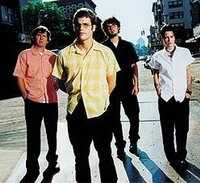Fusing unplugged guitars, honesty and street-smart wit, Josh Joplin Group combine their slightly bent storytelling style with rock 'n' roll intensity. Useful Music is the finest fruit of that collaboration. From the street-poetry swagger of lines like "a hat like Billy Jack's and a smile like Freddie Prinze" to the tenderness of Joplin's elegy for Ochs to the open-ended road energy of "Trailways" (my duffel bag is stuffed/I'm ready to go"), Useful Music dazzles.
Two highlights of Useful Music are singles for which the group enlisted ex-Talking Head Jerry Harrison as producer. With Harrison (Live, No Doubt, Verve Pipe) achieving a riveting interplay of sounds, "Matter" builds on a trenchant bass-line as gorgeous back-up vocals highlight some of Joplin's most assured singing (a haunting spoken-word interlude adds mystery and texture). Inspired in part by the movies of Paul Thomas Anderson, "Camera One," a tale of hard-life dreamers and suicide, of a "sandy haired son of Hollywood," a "trophy wife in Palisades" and a soul who "sells star maps to the sun." Josh describes the song as "the illusion of fame as validation of being" and measures the costs of fantasy as call-and-response vocals and an irresistible rhythm guitar power the music forward.
Shawn Mullins (best known for "Lullaby"), a Josh Joplin Group supporter since its inception, produced the bulk of Useful Music - and helped give its distinctive sound, while still allowing Joplin's indelible vocals and guitar playing to be clearly heard.
Those songs range from "I've Changed," a testimony to the power of renewal ("...everything I thought before/I won't think anymore"), to his bittersweet evocation of youth in the hinterlands, "Dutch Wonderland." Lamenting the lives of kids growing up with nothing to do, the song understands that it's exactly those kids who can be the craziest, the most courageous.
Similarly, "Who's Afraid of Thomas Wolfe" confronts and even celebrates ambiguity: while realizing that Wolfe's famous dictum that "you can't go home again" is right, the narrator nevertheless ventures back homeward. And yet he's clear-eyed, a kind of jaundiced visionary ("I spoke with God/I overslept/And I got fired from my job.")
Josh Joplin himself was raised in small-town America - Lancaster, Pennsylvania, the setting, in fact, of "Dutch Wonderland." Growing up, his musical tastes were fittingly eclectic: D.C. hardcore and Pete Seeger. But Dylan's The Times They Are A-Changin' and Joplin's exposure to Phil Ochs focused him. "I'd never heard such energy in a song, " he says of the night when he was 12 years old that he first heard their music. While retaining his allegiance to the rebel spirit of bands like Minor Threat, the Smiths and the Clash, he found another kind of rebellion that was just as powerful. At 16, he quit school and headed out on the road, an adventure that took him deeper into the music. He passed through Hibbing, Minnesota, Dylan's boyhood home, ventured to El Paso, the birthplace of Phil Ochs, communed for a while with the ghost of Woody Guthrie in Okemah, Oklahoma. Always, he wrote, sang and performed. "I was becoming a hardcore folk singer," he says, "the denim shirt and everything. I was caught in the spell -- everything from the Almanac Singers to even collegiate choirboy, hootenanny folk. It was the incredible optimism of the music that drew me in."
After a time washing dishes in New York City and staying at friend's apartment, Joplin heard Atlantan Kevn Kinney's MacDougal Blues and music by Michelle Shocked. Packing his bags, he headed South, only to find that, folk music of the classic Village Vanguard variety wasn't happening in Dixie, either. What was happening, however, was a singer-songwriter boom.
Hooking up with the likes of Mullins and Natalie Farr, Joplin started hitting coffeehouses, still as a solo act. Then he expanded. Joplin assembled the nucleus of the Josh Joplin Group with a full rhythm section. In time bassist/violist Geoff Melkonnian came on board, former Kelly Hogan keyboardist Allen Broyles and guitarist Deb Davis also joined in, and Joplin emerged as a different kind of songwriter. "I started writing songs I really wanted to write, rather than ones I thought my heroes might have written," he says. "And I began to realize that writing with a band in mind added an entirely new dimension."
Live, Joplin's storytelling, role-playing side comes to the fore, mixing off-kilter insights and unexpected kicks into their shows, while on record the experience is more intimate and immediate. Either way, a singularly strong set of songs shines through. "I write about belief and the struggle for it - belief in the struggle to ascend and transcend," Joplin says. "I write about what I aspire to - and the person I want to become, that's who I'm writing for."
And it's also the kind of music whose brilliance, wit and usefulness only grows. The more you play it, the brighter it shines.
